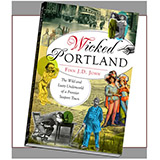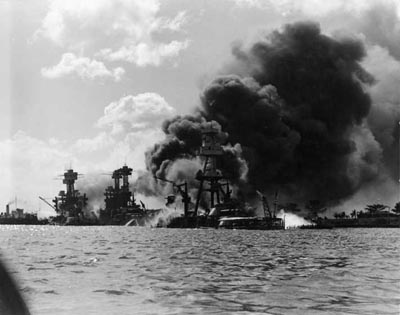Japan's curse: Saving the world every few dozen years
The world probably would have ended in nuclear holocaust in 1962, or have fallen to Nazi domination in 1946, had it not been for Japan. Now, it looks like they're doing it again.
By Finn J.D. John
March 15, 2011
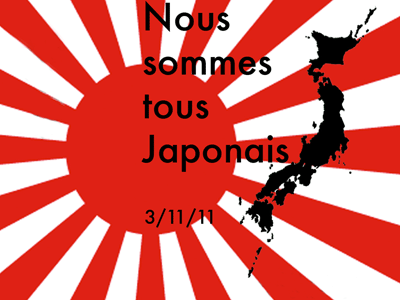
A graphic tip of the hat to Le Monde's front-page editorial
following the Sept. 11, 2001, incident in New York City. The
sentiment seems just as appropriate here.
For many onlookers, watching the earthquake-tsunami-meltdown event that’s still under way in Japan, the thought is unavoidable: Hasn’t Japan suffered enough?
But if there’s one thing worse than widespread suffering, it’s widespread suffering that does no one any good – and that’s one thing Japan cannot claim. If it weren’t for the staggering agonies suffered by this tiny-but-mighty country since 1941, the human species might be extinct.
Let me explain what I mean by this. And for those of you who are credentialed historians, or really serious history buffs, I apologize in advance for the speculative nature of these thoughts. Of course, you can’t document what doesn’t happen. But the things that might have not happened because of Japan include global Nazi domination, global thermonuclear war and now, possibly, multiple global reactor meltdowns (this last is, admittedly, more of a stretch).
These aren’t minor things. And the possibility that Japan – again, at tremendous cost to itself and its people – prevented them from happening in 1946, in 1962 and at some unknown date in the future simply can’t be denied.
1941: Hitler’s own worst enemy
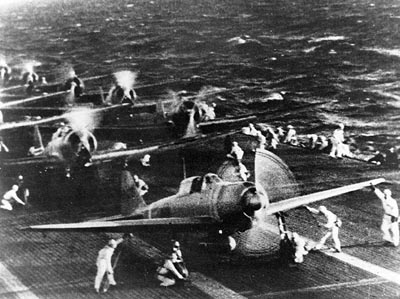
A group of Mitsubishi A6M5 "Zero" fighters prepare to take
off
to attack Pearl Harbor on Dec. 7,
1941. TheZero was
easily the
best carrier-based fighter in the world at that
time - possibly the
best fighter of any kind. (U.S. Navy
photograph, captured from
Japanese forces in 1943)
Let’s start with the prospect of global Nazi domination. In 1941, the Nazis were on the brink of overrunning the United Kingdom and thereby taking control of the biggest empire in world history. The only thing that could prevent this from happening, other than Hitler’s peculiar reluctance to attack the U.K., was the United States of America – which had absolutely no interest in getting involved. The only people who wanted to take on Germany were the diplomats and leaders who knew how perilous the situation was – President Roosevelt & Co. – but there was nothing they could do to motivate 200 million isolationist citizens who had no desire to fight.
But there was something Japan could do. And incredibly, it did. This tiny country – powerful for its size, but no match in anyone’s estimation for the biggest industrial power on Earth – hauled off and slugged the sleeping giant hard enough to draw rather a lot of blood. Instantly the fight was on, and thanks to Japan’s ill-advised-but-really-fortunate treaty with Germany, the fight was on everywhere. Four years later, the Nazis were goners, and you could argue that the moment Hitler lost the war – the moment it became inevitable that he would fail – was December 7, 1941.
So what would have happened if Japan hadn’t done this? Well, eventually it’s at least possible if not likely that Hitler would have overrun England, Lend-Lease or no. He then could have turned and attacked the Soviet Union without worrying about anyone attacking his rear. There’s not much the U.S. could have done without a friendly port in Europe to which to ship troops, and it’s a long way to Europe via north Africa. Furthermore, the process of Canada’s becoming independent from the U.K. was still under way in 1941. Could Hitler, as the new Guy In Charge in London, have turned Canada into his own asset? If so, the U.S. would have a major threat right at home. Sending its entire army to Europe would be suicide.
This pattern would likely have held through 1946, when Hitler’s scientists probably would have finished the nuclear bombs on which they’d been working so diligently.
Would all this have happened? Maybe, and maybe not. The point is, it didn’t, because someone in Tokyo decided to strike. The cost to Japan: Over the following four years, a shocking percentage of Japan’s population was wiped out along with huge sections of its best cities, a couple of which were also poisoned with lingering radiation.
Speaking of which, let’s talk about the second time Japan probably saved the world – just 14 years later.
1962: Rescheduling doomsday
In all the history of humanity, only one weapon has ever been invented that was, after its first use, put back in the holster for good (so far, anyway) – and that is nuclear fission.
Humans, especially military leaders, have a remarkable ability to think about destruction and casualties in abstract terms, using bloodless terms like – well, “destruction” and “casualties.” Witness the ease with which, a moment ago, we were abstractly talking about World War II, which killed 90 million people.
On its face, the reluctance to go nuclear is logically puzzling when you think about it. Conventional bombing of population centers with sufficient intensity to create firestorms in them had very similar effects to a nuclear strike and was business as usual, another tool to be deployed when the situation was dire enough. But not nuclear bombs.
Why?
Because of two Japanese cities that died so that the rest of us might live.
That’s arrogating a bit more insight than I really have a right to, but bear with me here while I explain why I believe this.
In 1945, the U.S. hit Japan with literally everything it had, in terms of nukes. Had the Emperor not surrendered after the second strike, it would have been a long time before a third was ready to go. But both those bombs were tiny little things, experiments really, just 35 kilotons between the two of them. Within a few years, bombs were being manufactured that were hundreds of times more powerful than that, and by the end of the 1950s not only were there hundreds of such bombs – enough to destroy the world several times over – but both the U.S. and the Soviet Union had the technology to deliver them anywhere on the globe at will.
So in 1962, when Nikita Khrushchev got himself backed into a diplomatic corner over Cuba from which his only face-saving exit involved global thermonuclear war, we should have been doomed.
Instead, Khrushchev backed down – essentially, falling on his sword. And he paid a high price for doing so, as a smart young fellow named Leonid Brezhnev was ready and waiting to take advantage of his sudden weakness.
Why did Khrushchev do this? Well, maybe it was just because he had a special ability to imagine how awful it would be if his country and ours started swapping piles. Mass casualties, radioactive hazards, nuclear winter – maybe he had a special ability to visualize what those sterile, clinical words represented in human suffering and loss.
Or maybe he’d read John Hirsey’s book, Hiroshima, in Russian translation. Maybe he’d seen film footage of the skin slipping off people’s hands like gloves, of shadows etched into stone sidewalks, of lingering deaths of hairless zombie-like children in hospital beds. Nuclear holocaust is nothing if not dramatic. For anyone to know that, really know it on a visceral level, reading the scientific reports wasn’t enough; someone had to stage that drama.
That someone was Japan.
So, what if they hadn’t staged it? What if they’d thrown in the towel when Germany did, months earlier, when the outcome of the war was absolutely clear?
What if? Well, the U.S. would have these super-cool new uber-weapons and no one to use them on … and a strong impulse to see what they could do. We can’t know if it would have scratched that itch – but it’s undeniable that it is human nature to do so. And by the time they did, chances are the weapons involved would have become big enough to kill us all – as they certainly had by 1962.
The effect of a nuclear weapon on a major population center is simply unimaginable. Trying to wrap your mind around it is like visualizing the difference between a billion dollars and a trillion. The scale makes a big difference, but very few people can visualize that difference.
But we can visualize nuclear holocaust … because Japan showed us what it looks like. I can’t prove it, but I am convinced the world would have ended in 1962, or maybe even earlier, if it had not.
Fukushima
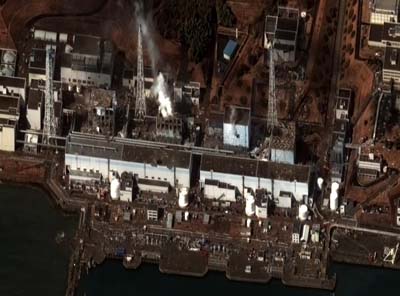
A satellite image made at 9:35 a.m. March 16, 2011, of the
smouldering Fukushima reactor No. 1. Photo is from
www.digitalglobe.com.
So now Japan faces a new nuclear mess. Thankfully, it’s a much less horrid one than they endured 65 years ago, but it’s still far from clear how much less horrid it will be. Meanwhile, countries around the world are watching and learning how reactors fail under pressure from natural disasters. And people around the world are suddenly talking about the costs of energy production.
Until last week, it was common to hear people say nuclear power was our best hope to stop climate change. Hardcore nuclear-power advocates are still saying that, but they’re sounding increasingly desperate and screechy.
Until last week, scoffing that “another Chernobyl” was impossible was the stock answer to concerns about nuclear energy’s safety. And that’s probably true. Chernobyl was bad, but could be blamed on antiquarian Soviet environmental stupidity – what kind of idiot designs a nuclear reactor with a flammable core, for Pete’s sake? But now a first-world nation with a tradition of top-shelf engineering and safety regulations has suffered a similar, albeit far less serious, blow. If it can happen in Japan, it can happen anywhere.
The moral of the story comes through loud and clear: Nuclear energy is not free.
Yet we are, as a world, on the cusp of a massive shift toward it as an alternative to burning more coal. From now on, instead of being seen as a relatively safe alternative to carbon emissions, nuclear energy will be seen widely as a different kind of poison, with different risks. This is a good thing.
Whatever our societies eventually decide to do with this conundrum, you can bet the dozens of power plants built on or near fault lines around the world – including a dozen or so biggies on the American west coast, and one pint-size research model in my own smallish town of Corvallis, Oregon – will be taking steps to learn from the Fukushima reactor meltdown. Germany already has announced it’s mothballing everything built before 1980.
If the world doesn’t see another reactor meltdown in the next half-century or so, it will probably be because of Fukushima. And if something traumatic happens on a global scale – say, an asteroid strike sending tsunamis around the globe – and every nuclear power plant at or near sea level doesn’t melt down, we’ll probably be able to say it’s at least partly because Japan saved the world – again.



